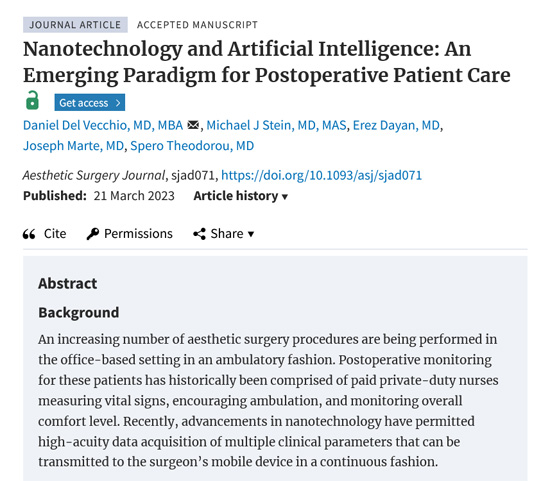bodySCULPT is proud to announce that a study titled “Nanotechnology and Artificial Intelligence: An Emerging Paradigm for Postoperative Patient Care,” co-authored by bodySCULPT’s leading plastic surgeon in Manhattan, NYC – Dr. Spero Theodorou, MD was published in the Aesthetic Surgery Journal, on 21 March 2023. The other authors are – Daniel Del Vecchio, MD, MBA, Michael J Stein, MD, MAS, Erez Dayan, MD, and Joseph Marte, MD.

This is the first report on the use of wearable cloth nanotechnology to continuously monitor patients postoperatively following aesthetic surgery, using BBL as the flagship procedure.
Postoperative monitoring for these patients has historically been comprised of paid private-duty nurses measuring vital signs, encouraging ambulation, and monitoring overall comfort level. The use of nanotechnology for postoperative monitoring represents an exciting new development in healthcare. Recently, nano-sensor technology woven into fabric has resulted in a wearable vest that can monitor, record, and transmit detailed physiologic data. This technology serves to provide the surgeon with continuous physiologic information postoperatively and provides an opportunity for surgeons to track, and potentially act upon, physiologic derangements that may reflect (or preclude) a complication. The purpose of the present study was to examine the feasibility of remote monitoring in postoperative cosmetic surgery patients.
The main objective of this study was to describe the authors’ early experience with this nanotechnology in the postoperative setting.
The results of this prospective IRB-approved study suggest that wearable cloth nanotechnology can provide quality data that allow for effective remote monitoring in postoperative cosmetic surgery patients by the plastic surgeon.
Twenty-three consecutive patients who underwent radiofrequency-assisted liposuction and Brazilian Butt Lift (BBL) were included in this study. The researchers evaluated the utility of an FDA-cleared cloth nanotechnology wearable multi-sensor vest in these consecutive patients and they wore this advanced vest postoperatively. The vest is a non-invasive, wearable, and portable device.
The primary outcome was device usability, reflected by compliance with device and completeness of data collection.
- Up to 91% of patients wore the device for greater than 12 hours a day in the first 48 hours.
- All patients endorsed comfort with the device and usability with different clothing styles.
- Only 39% of patients were noncompliant with instructions to avoid the sitting or supine position.
- No postoperative events were detected.
- The technology provided data on all 5 clinical parameters in all 23 patients.
The study concluded that “The quality of data collected allow for detection of clinical derangements and can alert the surgeon in real time, prompting intervention such as medicine administration, position changes or presentation to the emergency room.”
It has been proven that the use of wearable healthcare sensors allows for the ability to collect physiologic data over prolonged periods of time, which is not currently feasible in traditional clinical settings. The ability to monitor and analyze patients with wearables using big data allows for improvement of quality while decreasing costs.

